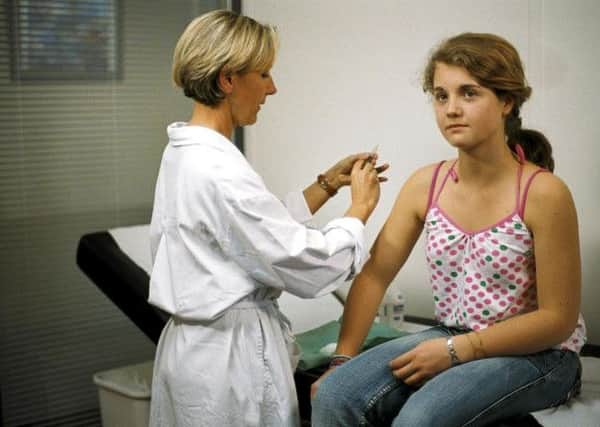HPV vaccine ‘reduces cervical cancer symptoms’


Research in the British Journal of Cancer suggested that the HPV vaccination programme, introduced in 2008, had caused a decline in young women found to have cervical abnormalities linked to cancer.
The experts said the study - the first of its kind - was encouraging but said women still needed to attend for cervical screening as the vaccine did not protect against all types of HPV - the virus which causes the majority of cervical cancer cases.
Advertisement
Hide AdAdvertisement
Hide AdResearchers from Health Protection Scotland (HPS) and the University of Strathclyde have been monitoring the impact of the HPV vaccine among women attending for cervical screening at the age of 20.
By linking individual vaccination, screening and HPV testing records, they were able to determine the early impact of the immunisation programme on pre-cancerous cells.
Dr Kevin Pollock, senior epidemiologist at HPS, said the findings were “very exciting” and demonstrated that high uptake of the HPV vaccine was associated with a significant reduction of cervical abnormalities in young women in Scotland.
The researcher said they had compared thousands of vaccinated and unvaccinated women coming through the cervical screening programme and referred on for further testing in Scotland.
“We saw a 55 per cent reduction in high grade cervical abnormalities associated with vaccination and a 29 per cent reduction in lower grade abnormalities,” he said.
“The vaccine seems to be quite strongly associated with a reduction which is quite encouraging.”
Dr Pollock said the study was important as it helped prove the benefits of vaccination over what had been shown in smaller clinical trials.
“When you introduce a vaccine it is always based on clinical trial data so this is the first population based surveillance study to show that the vaccine is doing what it is supposed to do,” he said.
Advertisement
Hide AdAdvertisement
Hide Ad“You are dealing with population numbers and not just hundreds of people.”
Dr Kim Kavanagh, research fellow at the University of Strathclyde, added: “To our knowledge, this is one of the first studies to show a reduction of pre-cancerous cells associated with the HPV vaccine at the population level.
“These data are very encouraging for countries that have achieved high HPV vaccine uptake.”
While the results are encouraging, the researchers said that regular attendance at cervical screening was still important.
“The vaccine doesn’t protect against all the HPV viruses,” Dr Pollock said.
“You will still have a proportion of women who could come forward with disease and that is why screening every three years is still important.”
There were also warnings from campaigners after figures published last week showed uptake of cervical screening in Scotland has continued to fall.
Jo’s Cervical Cancer Trust said just over one in four women aged 25 to 49 invited for screening every three years were failing to attend.
Advertisement
Hide AdAdvertisement
Hide AdFor those aged over 50, invited every five years, a fifth did not take up the invitation.
In 2012, 295 women in Scotland were diagnosed with cervical cancer and 112 died.
Jo’s Trust said if screening increased to 85 per cent, numbers diagnosed would drop by 21 per cent in just a year. But if rates continued to fall to 70 per cent, incidence could rise by 27 per cent.
Robert Music, chief executive of the charity, said: “We are extremely worried that if screening attendance continues to fall, numbers diagnosed will rise dramatically.
“Cervical cancer is a preventable disease primarily thanks to the cervical screening programme so we must do all we can to make sure women not only recognise the importance of this preventable measure and attend screening but that all those eligible are able to access the programme.”
SEE ALSO